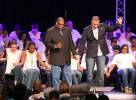Declaring Independence in Song
"Fat George has declared us in rebellion! Why in bloody hell can't they?"
-- John Adams in "1776"
Rebellions are brutal. Damage to body and soul is incalculable, death and destruction inescapable.
Yet in the midst of an epic struggle for the liberation of a nation lives the shining hope of choreography. The golden promise of production numbers. The eternal quest for musical-theater magic.
And founding fathers who can carry a show tune.
"It does have a camp element," says director Terrence Williams. "You take John Adams, who was very puritanical, and have him dancing around with a cane."
Starring Adams, Ben Franklin and Thomas Jefferson, and featuring the cast of the Second Continental Congress, "1776" is the July Fourth-themed independence play about the fierce verbal fireworks among delegates of the original 13 colonies that finally put America's undeclared break with Mother England in writing as the Declaration of Independence.
You remember those daffy days, right? Tea-dumping blowouts in Beantown? That whole taxation without representation kerfuffle? Imperial rule that so riled the colonies that they morphed into America and kicked some Brit butt?
"This is a great show for an election year because it can make people stop and think," says Williams, spearheading the rebel charge by Stage Door Entertainment that opens Wednesday at Spring Mountain Ranch State Park.
"When you look at the writing of the Declaration of Independence and then the show, you don't think it's going to be as goofy as it is sometimes," says Joey DeBenedetto, who slips into Jefferson's colonial britches and takes up his quill pen to author the feverishly debated document.
That's when he isn't lusting after the missus and contemplating homicide against "obnoxious and disliked" Adams, whose persnickety persistence to make the Declaration a done deal casts him as one of America's greatest -- and most grating -- patriotic pests. Railing against colleagues who cringe at the bold language advocating freedom and equality, Adams explodes: "This is a revolution, dammit! We're going to have to offend SOMEBODY!"
But in a show that deploys sly humor to strip Historical Figures down to mortal men, Adams' pomposity is punctured by the impish Franklin, as when the two -- at times almost a colonial vaudeville act -- wait out Jefferson's horizontal hula with wife Martha:
Adams: "This is indecent!"
Franklin: "Oh John, they're young and they're in love."
Adams: "Not them, Franklin -- us! Standing out here, waiting for them to ... I mean, what will people think?
Franklin: "Don't worry, John, the history books will clean it up."
"Some of the things Adams and Franklin say to each other are hilarious," DeBenedetto says. "The relationships they build are very unexpected."
Nearly as unlikely as America's tattered troops triumphing over the regimented redcoats is a show that turns a monumental moment in world events that's often lionized into history-class stodginess, into a musical. But the 1969 Tony-winner is tuneful, comedic and dramatic, with compelling scenes of congressional combat as delegates argue the merits of independence and the morals of slavery.
The score lends "1776" its emotional underpinnings: Adams' frustration at Congress' dithering ("Piddle, Twiddle and Resolve"); Virginia's Richard Henry Lee bragging over his blue-blood brood ("The Lees of Old Virginia"); South Carolina's Edward Rutledge in a scathing attack on the North's hypocritical complicity in the slave trade ("Molasses to Rum"); Adams' long-distance duet with wife Abigail ("Yours, Yours, Yours"); his desperation tinged with optimism ("Is Anybody There?").
"The show deviates a little from history," Williams says, pointing out such discrepancies as all the delegates signing the Declaration at once. Only John Hancock affixed his, well, John Hancock on July 4, the other 55 delegates waiting until August. Or passage of the Declaration finally hinging on the vote of Pennsylvanian James Wilson, who preferred to hide from history.
"If this show keeps people on the edge of their seats and moves their interest forward, it's a great thing," says Williams, who distributed Thomas Paine's "Common Sense" to his cast and assigned them to research their characters.
"I read David McCullough's biography of Adams -- the description of 'obnoxious and disliked' were his own words," says Nick Caruso of his perpetually peeved character, who snipes: "One useless man is called a disgrace, two are called a law firm and three or more become a Congress."
"He was extremely passionate and had a very strong sense of right and wrong," Caruso says. "There's a lot in the show about his puritanical upbringing and it gave me great fodder for reaction to little things. And I read letters between he and his wife."
Those enduring exchanges were challenging to enact for Abigail's portrayer, Jennifer King. "I'm acting out letters and I have to bring them to life and be romantic toward someone who isn't there," she says of Abigail, who in one letter writes: "Think of it, John, married to the man who is always first in line to be hanged."
"I was surprised she wasn't educated but she was very intelligent because she was so curious and in love with books. She had a big role in history and I never knew that."
Donning Franklin's wiry specs, Kevin Ruud perused his autobiography as prep work. "He was happy and jovial, but serious about slavery and independence, which he had been fighting for, for years," Ruud says about the philosopher/inventor who, when a delegate condemns "illegal" rebellion, quips: "Rebellion is always legal in the first person, such as 'our rebellion.' It's only in the third person, 'their rebellion,' that it becomes illegal."
Jefferson's introspection most intrigued DeBenedetto. "It's how calm and serene he is, how introverted, and what makes him upset to the point he has to say something," he notes about the brilliant statesman. "He has a lot of things to say on the inside and to find how to portray that on the outside was interesting."
But Jefferson could wield a wicked tongue. When Adams, appalled he hasn't penned the Declaration after a week, observes that the Earth was created in that time, Jefferson replies: "Someday, you must tell me how you did it."
As Martha, the nubile newlywed for whom he pines (also a factual stretch -- they married in 1772), Lisa Marie Smith admires the third first lady's strength, but had to curb the surprising suggestiveness of her featured song, "He Plays the Violin," extolling her hubby's favored form of foreplay.
"It's a rather sexual song but we're playing that down because a lot of families come to this," Smith says. "So now it's more of an innocent love song. Terrence keeps telling me, 'You can't do that movement with that word because it comes off the wrong way!' "
Naughty little minx, that Martha, when she sings: "I hear his violin and I get that feeling within; And I sigh, oh I sigh; He draws near, very near; And it's hi-hi-hi-diddle-diddle; Goodbye to the fiddle; My strings are unstrung."
Even absent George Washington invites some revolutionary ribbing when, after hearing his demoralizing report about his misery-stricken militia, a delegate quips: "That man would depress a hyena."
So crack a joke, dance a jig, sing a song, declare independence. In "1776," our founding fathers are like proud papas.
They've got revolution on the brain, but show tunes in the soul.
Contact reporter Steve Bornfeld at sbornfeld@reviewjournal.com or 702-383-0256.
PREVIEW What: "1776" When: Wednesday - Saturday through July 26; gates open at 6 p.m., show at 8 p.m. Where: Spring Mountain Ranch State Park, 18 miles west off Charleston Boulevard Cost: $10 in advance; $15 on show night (594-7529)




















